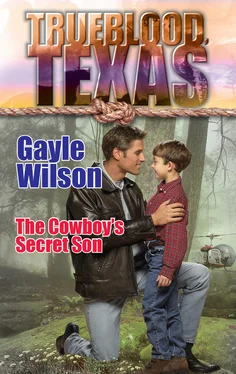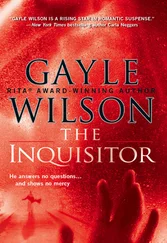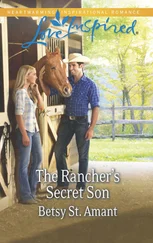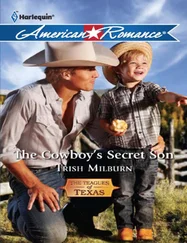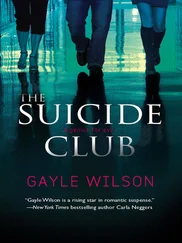For the first time in her life she wished that she had a gun. Although she had grown up around them, she had never thought she was the kind of person who would ever want or need a firearm. Faced with the realities of where she was living now…
She forced herself to move across the den, tiptoeing so that her slippers made only a slight shuffling noise on the hardwood floor. When she was near enough, she could stand behind the protection of the open door and look through it into the yard. Maybe there would be enough moonlight to allow her to take a look around without leaving the house.
Taking a deep breath, she took the final step to the door and grasped the knob in her right hand. The metal was cold under her palm, and for some reason, now that she was here, she couldn’t seem to make herself move any closer to the opening. If there was someone waiting outside—
Idiot, she chided herself. Why kick in the door to a house and then wait around outside? If someone was that eager to get inside, they’d already be here. A thought that was hardly more comforting.
So why hadn’t she turned on the lights? Why didn’t she now? The switch that controlled them was just on the other side of the doorway. All she had to do was step across, closing the door in the process, and flick it on. All she had to do, and yet she seemed paralyzed, unable to act.
She drew in another deep breath, gathering her courage, and in the silence she heard movement out on the porch. As if released from a spell, she pushed the door hard, and as it swung closed, she reached across the narrowing opening, intending to flip up the switch.
A dark shape loomed before her, seeming to spring up from the floor of the porch. The terrifying image lasted only a split second—too short a time for identification—before the door slammed closed. Quickly she turned the lock, putting a barrier, however fragile, between her and whatever—whoever—was out there.
CHAPTER FOUR
“PE-EW,” Ronnie Cameron said, wrinkling his nose in disgust and drawing the sound out. He hurriedly closed the black garbage bag, pulling the plastic strings tight.
A little late for that, Jillian thought.
“What in the world is in there?” the sheriff asked, carefully laying the bag back on the floor of the front porch.
“It seems to be roadkill,” Jillian said. “Aged roadkill from the smell. Armadillos and a few less recognizable victims.”
Her voice was very quiet. Anyone who knew her well could have told the sheriff that she was exerting enormous self-control. Which she was. Now that it was daylight, her fear had been replaced by anger, and much of it was self-directed because she had let herself be so terrified.
“You’re saying somebody dumped this on the porch and then kicked in your door?”
“The door was open when I got up to investigate,” she clarified. “I’m not sure it was kicked in. I would think there would be some damage if it had been. But it was open.”
“You see who it was?”
“I saw a shape. Nothing else. Certainly not enough to make an identification.”
She didn’t confess that she had been too frightened last night to realize that if she’d turned on the outside lights and opened the door, she might have been able to do exactly that—make an identification. Instead, she had turned the lock and sagged against the door, trembling all over. It wasn’t until the running footsteps outside faded into the distance that she’d even thought about opening it again and looking out.
“I plain don’t know what to tell you,” the sheriff said, shaking his head and looking down again on the foul-smelling bag in disbelief. “I haven’t seen anything like this since I’ve been in office. Never heard of anything like it since grammar school.”
“So who was responsible for this kind of thing back then?” Jillian asked, the edge still in her voice.
“I didn’t mean that literally. It’s just that this business seems so…juvenile.”
That was the perfect word, Jillian thought. Juvenile.
“Any idea why somebody would do this?” Ronnie asked.
“That’s why I called you,” she said. “Because I don’t have any idea. I thought maybe you did. I was also hoping you could get fingerprints off the bag or something.”
“That’s not likely. I can guarantee you that whoever put this together was wearing gloves. And not just because everybody who’s going to commit a crime nowadays knows enough from television to do that, but for sanitary reasons. Trust me, nobody would handle the stuff that’s in there with their bare hands.”
He was probably right, Jillian acknowledged bitterly. She had known that finding usable fingerprints would be a long shot.
“Not much of a welcome home, I guess,” Ronnie said.
“You think that was the message this was supposed to convey? That I’m not welcome?”
“A lot of folks don’t remember your family any too kindly.”
“What exactly does that mean?”
“When your daddy ran off, he left a lot of people holding the bag.” He glanced down at the sack at his feet.
Involuntarily Jillian’s gaze followed his. She wondered if he had meant to suggest there was some connection between that metaphoric “bag” and this.
“I don’t understand,” she said.
“He left here owing a lot of people money.”
Reluctantly, Jillian dredged up the memories of that time. She had thought her life was ruined because she had been forced to leave Mark. And her father had forbidden her to even speak his name. Just as he had forbidden her to write or call him.
She had, of course. None of the things her father had threatened her with could have kept her from doing that, especially not after she had discovered she was pregnant.
“My dad left here owing people money?”
The sheriff studied her closely a moment before shifting his attention to the vista that spread in front of them.
“Your old man and Bo Peterson had taken out loans with just about everybody within a hundred miles. By the end, they didn’t own a cow or a teacup that wasn’t hocked or mortgaged.”
“Are you saying my dad took out a mortgage on his ranch?”
That didn’t sound like her father.
“A couple of them, or so I heard. Course, you could hear just about anything around here after your family run off in the middle of the night. Believe me, there were a lot of explanations offered for that.”
“He had lost the ranch,” she said softly.
It was only now that she realized that this loss, and not her relationship with Mark, was the reason her entire life had changed in the course of one night.
“They both did. Lost everything. Bo held on a little while longer, but even when your place was sold at auction, it didn’t bring in enough to pay off both mortgages and the rest of the loans. That’s when they foreclosed on the Peterson ranch.”
“The Petersons lost their land, as well?”
“Bo never got over it. It killed him in the end.”
“I thought Mark was still living there.”
“Not in years. He was in the service for a while. Just came back here a couple of months ago. He’s working for the people who own his daddy’s ranch now.”
That must have been a bitter pill to swallow for someone with as much pride as Mark had always had. Jillian wondered why he had come home at all. But of course, so had she.
“Bo and my dad signed loans together?” she repeated, trying to make sure she understood what Ronnie was saying. “For what?”
This wasn’t something she had heard before. And frankly, it didn’t make a whole lot of sense. Why would her dad and Mark’s father have taken out joint loans?
Ronnie shook his head. “Nobody knew. Maybe they were going in together on some kind of hybrid. Bo was always talking about finding the perfect breed for raising beef cattle up here.”
Читать дальше
